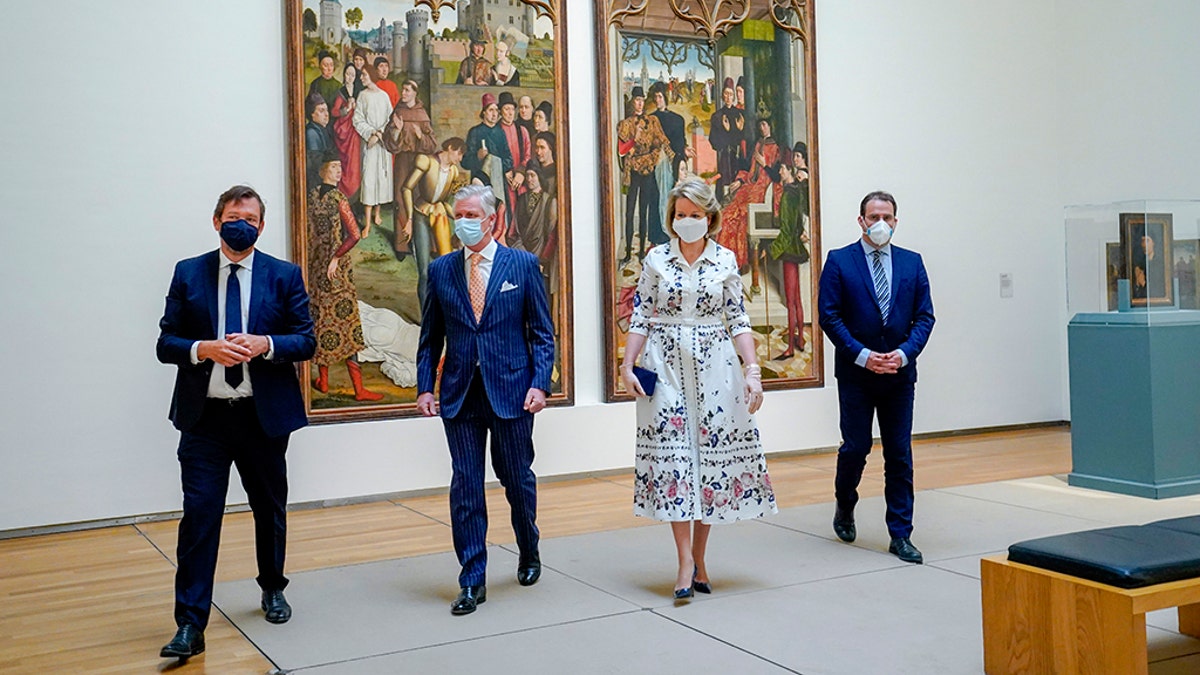Fox News Flash top entertainment headlines for May 21
Fox News Flash top entertainment and celebrity headlines are here. Check out what's clicking today in entertainment.
Get all the latest news on coronavirus and more delivered daily to your inbox. Sign up here.
Studies by the United Nations Educational, Scientific and Cultural Organization (UNESCO) and the International Council of Museums (ICOM) show 90 percent of the planet’s museums, some 85,000 institutions, have had to shut at least temporarily, while one in eight museums worldwide could face permanent closure because of the coronavirus pandemic.
“Nearly 13 percent of museums around the world may never reopen,” UNESCO and ICOM said in a joint statement on International Museum Day on Monday, saying those in poorer countries face a greater risk.

Visitors wearing face mask to prevent the spread of COVID-19, look at 'The Boy with Thorn" a first century B.C. bronze statue in the Rome's Capitoline Museums, Tuesday, May 19, 2020. (AP Photo/Alessandra Tarantino)
Things are pretty bleak in wealthy countries too.
CORONAVIRUS: WHAT YOU NEED TO KNOW
The Network of European Museum Organizations said large institutions in tourist hotspots like Paris, Amsterdam and Vienna have suffered income losses of up to 80 percent, which can reach hundreds of thousands of euros a week.
A survey by Americans for the Arts said the American arts and culture sector has lost $5.5 billion to date.
“We are fully aware of and confident in the tenacity of museum professionals to meet the challenges posed by the COVID-19 pandemic,” said ICOM President Suay Aksoy. “However, the museum field cannot survive on its own without the support of the public and private sectors. It is imperative to raise emergency relief funds and to put in place policies to protect professionals and self-employed workers on precarious contracts.”

A museum employee wearing a face mask to prevent the spread of COVID-19 fills a bottle at a fountain next to the 3rd century marble statue known as Marforio, at Rome's Capitoline Museums, Tuesday, May 19, 2020. (AP Photo/Alessandra Tarantino)
Overall, the picture is dark, more Munch than Monet.
“It is alarming data that we are giving,” Ernesto Ottone, assistant director general for culture at UNESCO, said in an interview with the Associated Press Tuesday.
He said the problem cuts across the board, affecting museums big and small, new and established, featuring art or science.
Museums that indicated they might well not reopen, he said, “have been closed for months and they have no revenues. And they don’t know how they’re going to get their revenues.”
And once they do reopen, Ottone said, “they [won’t] have the capacity to update their infrastructure” to conform with social distancing and other pandemic precautions.

Visitors wearing a face masks to prevent the spread of COVID-19 admire statues in the Rome Capitoline Museums, including the second century A.D. Roman marble statue "Cupid and Psyche", at right, Tuesday, May 19, 2020. (AP Photo/Alessandra Tarantino)
Museums are starting to reopen in some countries as governments ease coronavirus restrictions.
It is little wonder that royalty and prime ministers are now lining up to boost their cultural institutions.

Belgium's King Philippe, center left, and Belgium's Queen Mathilde, center right, wear face masks, to prevent the spread of coronavirus, as they visit the Royal Museum of Fine Arts in Brussels, Tuesday, May 19, 2020. (Daina Le Lardic, Pool Photo via AP)
“We have to show our support at the maximum level to this sector by coming here, to show that they are open again and that people can come back here in complete safety, but also by taking measures and decisions ... to support them,” Belgian Prime Minister Sophie Wilmes said Tuesday, touring the reopened Bozar Center for Fine Arts in Brussels.
King Philippe of Belgium and Queen Mathilde visited the nearby Royal Museums of Fine Arts, wearing protective masks.
CLICK HERE FOR COMPLETE CORONAVIRUS COVERAGE

A museum employee cleans a statue, as a visitor wearing face mask to prevent the spread of COVID-19 walks in the Rome's Capitoline Museums, Tuesday, May 19, 2020. (AP Photo/Alessandra Tarantino)
“Museums play a fundamental role in the resilience of societies,” said UNESCO Director-General Audrey Azoulay. “We must help them cope with this crisis and keep them in touch with their audiences. This pandemic also reminds us that half of humanity does not have access to digital technologies. We must work to promote access to culture for everyone, especially the most vulnerable and isolated.”
The Associated Press contributed to this report.









































